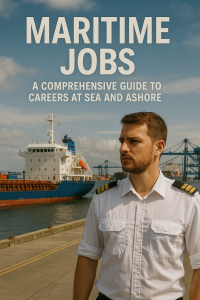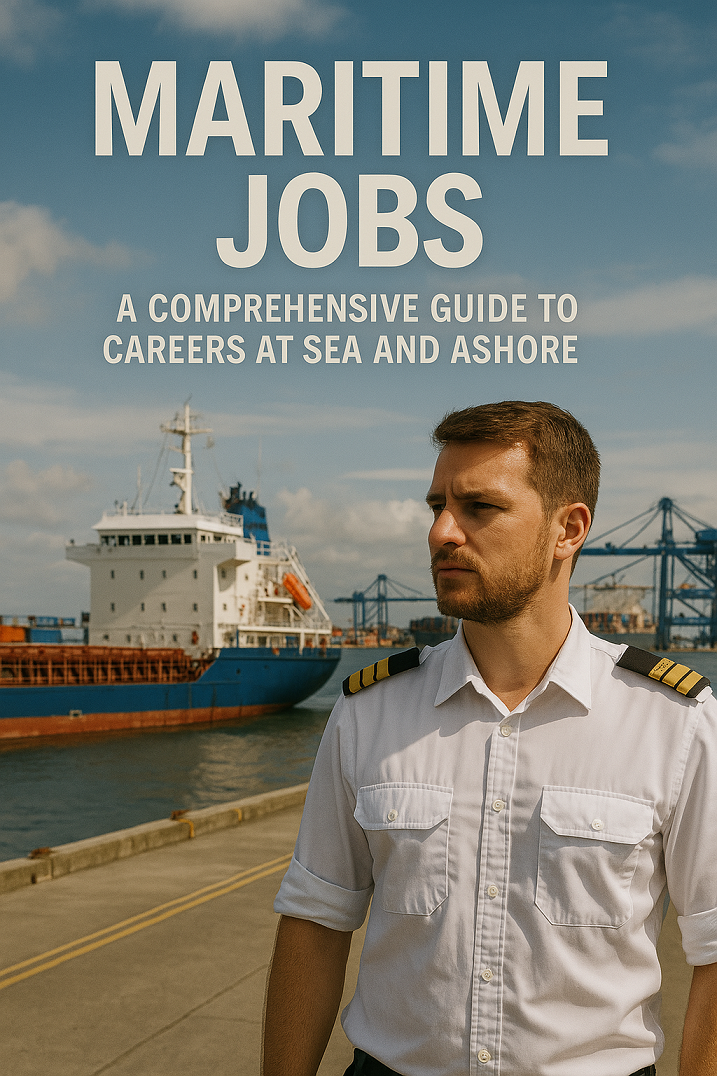Explore the wide world of maritime jobs—from deck officers to port managers. Learn how to start a career at sea, STCW certification requirements, salary expectations, and future industry trends. Perfect for cadets, ship officers, and maritime enthusiasts.
What Makes Maritime Jobs So Unique?
Did you know that over 1.9 million seafarers work aboard commercial ships globally, keeping the wheels of international trade turning 24/7? From navigating cargo vessels through narrow straits to managing port logistics or designing eco-efficient ships, maritime jobs offer a wide range of dynamic and rewarding career paths.
Whether you’re a student dreaming of life at sea, a cadet preparing for your first voyage, or a professional aiming to switch careers, this in-depth guide will help you explore the exciting and essential world of maritime careers.

What Are Maritime Jobs?
Maritime jobs include all careers connected to the operation, management, regulation, and support of ships and marine infrastructure—both at sea and ashore.
🔹 Major Categories of Maritime Jobs:
-
Seafaring/Shipboard Jobs (e.g., officers, engineers, ratings)
-
Port and Terminal Operations
-
Maritime Logistics and Shipping
-
Naval Architecture and Marine Engineering
-
Maritime Law and Administration
-
Offshore Energy and Subsea Services
⚓ These roles are critical for transporting over 90% of the world’s goods and ensuring safe, efficient, and sustainable maritime operations.
Popular Maritime Jobs (With Roles & Responsibilities)
🧭 1. Deck Officers
-
Responsible for navigation, ship handling, cargo operations, and maritime communication
-
Ranks include: Deck Cadet, Third Officer, Second Officer, Chief Mate, and Captain (Master)
⚙️ 2. Marine Engineers
-
Manage engine room machinery, power generation, fuel systems, HVAC, and emergency repairs
-
Career path: Engine Cadet → 4th/3rd/2nd Engineer → Chief Engineer
🔧 3. Ratings (Support Crew)
-
Includes Able Seamen (ABs), Oilers, Bosuns, and Wipers
-
Assist with maintenance, watchkeeping, and general duties onboard
🌊 4. Port and Shore-Side Jobs
-
Port Agent, Vessel Planner, Marine Surveyor, Harbor Master
-
Key roles in managing cargo flow, safety checks, documentation, and ship-port interface
⚡ 5. Offshore & Energy Sector Jobs
-
Roles on oil rigs and wind farms: Offshore Installation Manager (OIM), ROV Operators, Subsea Engineers
⚓ 6. Marine Pilots and Tug Masters
-
Guide ships in and out of ports, especially through narrow or congested waters
How to Start a Career in Maritime?
🧭 Step-by-Step Guide:
-
Choose Your Career Path
Decide between seagoing (deck/engine) or shore-based roles (logistics, management, marine law). -
Enroll in a Maritime Academy or Training Institute
Look for institutes that offer STCW-compliant training. -
Complete Required Certifications
-
Basic Safety Training (BST)
-
Certificate of Competency (CoC)
-
GMDSS for communication roles
-
Medical fitness certification
-
-
Apply for Cadetship or Internship Programs
Start with a shipboard training phase to log sea-time. -
Advance Through Experience and Exams
Get promoted by completing service periods and passing regulatory exams.
📘 Tip: Use job platforms like Maritime Union or Sea Career to find openings.
STCW Certification Requirements (For Seafarers)
The STCW Convention (Standards of Training, Certification and Watchkeeping) by the IMO ensures global uniformity in seafarer qualifications.
🎓 Key Courses Include:
-
Personal Survival Techniques
-
Fire Prevention & Fire Fighting
-
Elementary First Aid
-
Personal Safety & Social Responsibilities
-
Proficiency in Survival Craft (for advanced ranks)
Salary Expectations for Maritime Jobs
| Position | Average Monthly Salary (USD) |
|---|---|
| Deck Cadet | $500 – $1,000 |
| Third Officer | $2,000 – $3,500 |
| Chief Mate | $4,000 – $6,500 |
| Captain | $7,000 – $12,000 |
| Engine Cadet | $500 – $1,000 |
| Chief Engineer | $7,000 – $11,000 |
| Marine Pilot (Port-based) | $8,000 – $15,000 |
| Port Operations Manager | $4,500 – $9,000 |
💡 Salaries vary by flag, vessel type, experience, and region.
Latest Trends in Maritime Careers
🌱 1. Green Shipping Careers
-
Growing demand for experts in sustainable fuels, emissions control, and EEXI/CII compliance
💻 2. Digital & Tech-Driven Roles
-
Cybersecurity specialists, fleet data analysts, digital twins and AI-based fleet operations
⚙️ 3. Hybrid Skills Needed
-
Officers now need basic knowledge of IT systems, automation, and electrical engineering
👩🚀 4. Women in Maritime
-
Increasing efforts to promote diversity and inclusion through IMO and WISTA
FAQs: People Also Ask
What are the best-paying jobs in the maritime industry?
Chief Engineers, Captains, Marine Pilots, and Offshore Installation Managers are among the highest-paid roles.
How can I get STCW certified?
Enroll in an IMO-approved maritime training center, complete required courses, and pass assessments.
Do maritime careers offer job security?
Yes, the maritime sector offers strong global demand, especially for qualified officers and technical personnel.
Can I work ashore after being at sea?
Yes! Many former seafarers transition into port operations, maritime education, classification societies, or technical superintendents.
Conclusion: Your Voyage Starts Here
The maritime industry offers more than just a job—it offers a lifestyle, adventure, global exposure, and high career growth potential. With increasing digitalization, sustainability focus, and global trade demand, maritime jobs are evolving faster than ever.
⚓ Next Steps:
-
Download Free STCW Checklist PDF

